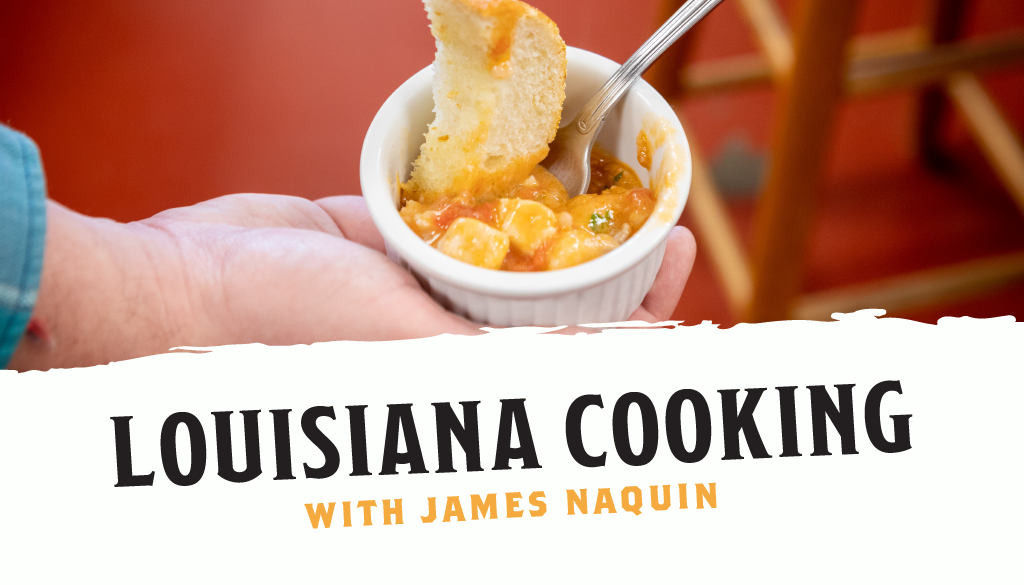21 Jun Celebrate Cajun Culture with Upcoming Cooking Class

This August, we’re hosting a cooking class to celebrate Cajun influence in the culinary world. Read our story below to learn more about James Naquin’s upcoming Louisiana Cooking class!
Notice: This Class Has Passed. Please check out our other Cooking classes.
Louisiana Cooking with James Naquin
James was born in Houma, Louisiana, and started cooking at an early age as an avid home cook. He completed the culinary program at A-B Tech in Asheville, NC and began a 21-year career of professional cooking in a variety of different cuisines. James teaches cooking classes offering a full cultural immersion to engage his students through books, food, music, and video.
James will be teaching Louisiana Cooking that will dive into the mashup of flavors and dishes Louisiana-style cooking incorporates.
BW: Tell us about yourself and your background in cooking. How did you get started?
JN: I love cooking! I grew up in south Louisiana and started cooking at a very early age with my grandparents and parents. There is such an emphasis on food in south Louisiana that the seasons aren’t separated by spring, summer, fall, or winter but by the foods that are harvested at that time (i.e., crawfish, shrimp, sugarcane, etc.). I started cooking professionally in 2001 and a few years after moving to NC I attended culinary school at A-B Tech in Asheville. I have cooked many kinds of cuisine over the years in scratch kitchens around the state. I left kitchen life in 2021 and haven’t looked back. I do cook at home a lot with my wife and find it much more enjoyable.
BW: Tell us more about the specific approach to teaching you’ll be taking in your upcoming classes.
JN: Cajun food is all about technique. It is rooted in French cuisine and follows the same techniques, but is adapted to the rural Louisiana experience. Creole cooking shares some similarities but is influenced by several cultures and came from more metropolitan areas like New Orleans.
How the dishes we make are treated dictates the outcome of what I think of as creating very particular flavors of the region they were born from. I bring a professional yet fun style to teaching. I will present this class with a multidisciplinary approach using food, music, film and other visual aids. We will eat good and learn a few things along the way.
BW: What can students expect to leave your class with?
JN: If I do my job right we will all leave with a full belly, recipes that can be replicated at home, and a new string of expletives that would make your grandma’s wig catch on fire.
BW: What does the word “Cajun” mean to you?
JN: To me, Cajun means heritage. There are so many ideas packed into that word. It comes with an origin story that is shared with most of the people around you, which is what makes cultural expressions like the stories, music, and food easy to hold on to and pass down to the next generation.
Growing up in Louisiana automatically involves you with the heritage, food, dance, and music. There was a Mardi Gras parade right outside the hospital the day I was born! It truly was a different way of growing up.

Chicken-sausage gumbo

Mardi Gras celebration at Stanbury Restaurant in Raleigh

Crawfish boil in Houma, Louisiana
Register for James’ Upcoming Class
Louisiana Cooking
Louisiana style cooking combines elements from West African, French, Spanish, and Native American cuisines and pairs them with ingredients readily available in the American South-resources like rice, okra, and crawfish. Explore the flavors and techniques used in traditional dishes. Learn to brown meat, whisk up a roux, make gravy, and prepare gumbo. If time and weather allow, we may also do some outdoor cooking in the traditional Louisiana style. $
Notice: This Class Has Passed. Please check out our other Cooking classes.



No Comments